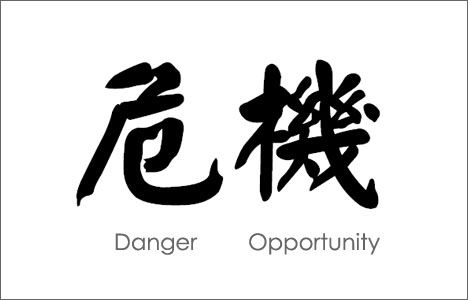‘Crisis’ in Chinese: A Dangerous Opportunity for Jelly Doughnuts
When John F. Kennedy famously declared, “In the Chinese language, the word ‘crisis’ is composed of two characters, one representing danger and the other, opportunity,” a crisis communication credo was born. Kennedy, whose love of foreign expressions would later earn him an undeserved reputation of having an insatiable appetite for pastries and a more deserved one for habitually practicing translational malpractice, wasn’t the first to invoke the connection, but he did introduce the tidily packaged aphorism to the masses.
There’s just one problem: it’s not true.
The Chinese phrase for “crisis” is “Wēijī:” 危机. Wēi, 危, does in fact mean danger. However, Victor Mair, Professor of Chinese Language and Literature at the University of Pennsylvania, writes that, in this context, Ji (机), represents an “’incipient moment; [a] crucial point (when something begins or changes).’ Thus, a Wēijī is indeed a genuine crisis, a dangerous moment, a time when things start to go awry.”
Ben Zimmer, language columnist for the Wall Street Journal, wrote that President Obama cannily dropped the Chinese character framing when linking crisis to opportunity in a weekly address; in doing so, he eschewed the august, bipartisan tradition continued by luminaries like Richard Nixon, Condoleezza Rice and Al Gore (who notoriously dropped the line in his acceptance speech for the Nobel Peace Prize). Maybe he discarded it because his speechwriters felt the rhetorical device had drifted into cliché. Perhaps his fact-checkers stumbled upon a copy of a Chinese dictionary the night before. We may never know.
Still, the expression’s durability echoes our own philosophies at Firmani + Associates, beliefs drawn from a deep well of experience helping clients navigate crises. Stepping into a crisis with a clear plan will equip you with tools to steady your hand and, when appropriate, strike prudently and decisively as you steer through the storm. You might pick up a scar or two along the way, but, properly managed, a crisis will also bring the opportunity to reassure, to renew trust, to reinvent.
That said, resolving a crisis probably shouldn’t require butchering foreign languages along the way. Why not follow the lead of Homer Simpson instead?
“Lisa: Look on the bright side, Dad. Did you know that the Chinese use the same word for “crisis” as they do for “opportunity”?
“Homer: Yes! Crisitunity!”






